- [课程通道] Gene Interference and Cat Allergen Silencing Research Project
- [课程通道]
- [科学少年] 2025-10-05
- [科学少年] 2025-10-02
- [科学少年] 2025-10-01
From Research Novice to International Conference Presenter – My 6-Year Scientific Growth Journey 爱博物 2025-10-05
In the summer of 2020, I stepped into a laboratory for the first time, clutching a pipette in my hand. Seeing the green fluorescence emitted by GFP expressed in E. coli under the UV lamp for the first time was my initial, direct experience of the wonder of molecular biology. The awe I felt in that moment remains unforgettable. Little did I know then that this would mark the beginning of a research journey that would change my life. Looking back now, six years later, from a higher research platform, every project, every challenge, and every achievement clearly marks my growth trajectory.
PART 1
The Green Fluorescent Protein Project: The Initiation into Research
The origin of this project traces back to my curiosity about bioluminescence during middle school. In the IBOWU science project, I experienced the entire standard process of molecular biology: from plasmid extraction, restriction enzyme digestion, and ligation/transformation, to E. coli culture and protein expression. The most unforgettable moment was seeing the bright green glow of the GFP I had successfully expressed under the UV light for the first time. The joy of turning theoretical knowledge into practical results truly made me appreciate the allure of scientific research. In subsequent learning, I further attempted Western blot and simple protein purification experiments, initially mastering these fundamental skills. More importantly, it cultivated a rigorous experimental attitude and scientific thinking, marking the starting point of my subsequent research path.
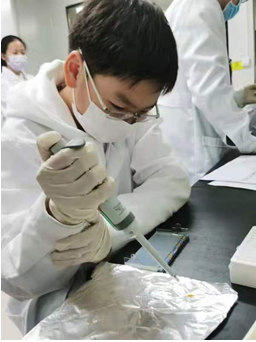
PART 2
Virus Identification and Species Authentication: New Horizons in Interdisciplinary Learning
In the winter of 2020, against the backdrop of the global pandemic, I chose IBOWU's Virus Identification and Species Authentication project. This project introduced me to the field of bioinformatics for the first time, teaching me how to use BLAST for sequence alignment and MEGA software to construct phylogenetic trees. I still remember the excitement of successfully drawing my first viral evolutionary tree using the Meta software that scientists use in their work. This project taught me how to handle massive biological datasets and made me recognize the importance of interdisciplinary research. Surprisingly, this experience trained my ability to process and analyze large volumes of data, and this data mindset also proved helpful later when I dealt with the big data generated from AFM mechanical experiments.
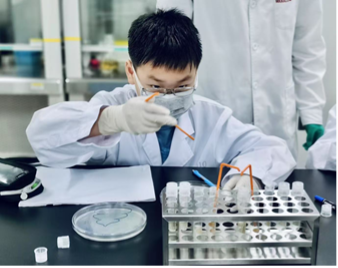
PART 3
iGEM International Genetic Engineering Machine Competition: Comprehensive Training in Teamwork
In 2022, as the youngest member of the team, I participated in the iGEM competition, known as the "Olympics of Synthetic Biology." Our project involved using synthetic biology to produce astragaloside, potentially for treating Alzheimer's disease. During the three-month preparation period, we faced numerous challenges, including redesigning experimental protocols, repeated data verification, and writing materials in English. During the toughest times, we dedicated hours daily for two consecutive weeks. But when we finally stood on the podium receiving the Gold Medal, all the effort felt rewarded. This experience gave me a profound understanding that true growth often happens in the most difficult moments – when experiments failed repeatedly and data was lost, it was the mutual encouragement and support from team members that helped me learn to stay calm under pressure.
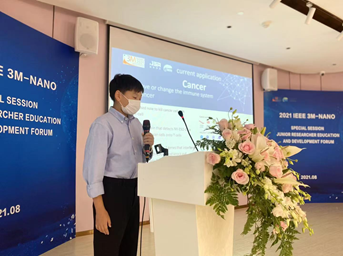
PART 4
IEEE International Academic Conference: A Valuable First Experience in Academic Exchange
That same year, I attended the IEEE-3M NANO international conference as the leader of the experimental group. Every step, from drafting the manuscript and repeated revisions to creating the presentation PPT and rehearsal practices, was challenging. I particularly remember the Q&A session; facing questions from experts worldwide, I learned how to respond calmly and communicate openly. This experience taught me that the essence of academic exchange lies not in perfection, but in sincere and open academic dialogue. It made my English expression more confident and poised, and I truly understood the dynamics of communication within the international academic community.
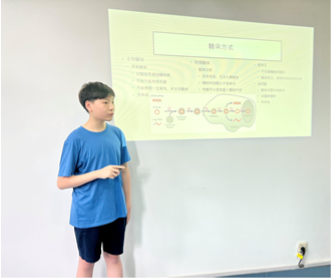
PART 5
Nanotargeted Drug Research: Deepening Expertise in a Specialized Field
In 2024, as my research capabilities grew, I participated in IBOWU's Nanotargeted Drug project, gaining in-depth understanding of cutting-edge research in nano-drug delivery systems. The project focused on the design and optimization of advanced delivery technologies like Lipid Nanoparticles (LNP). Through participating in the LNP drug delivery related learning project, I learned about design concepts such as surface modification to improve targeting and environmentally responsive release. This made me recognize the potential of nanotechnology in enhancing drug efficacy and reducing side effects. It gave me a deeper understanding of translational medicine and allowed me to see the vast potential for basic research to move towards clinical application.
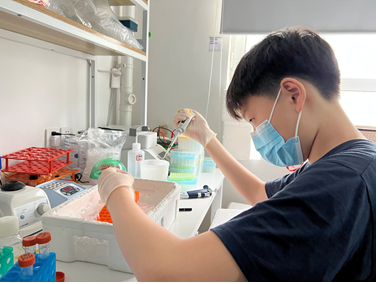
PART 6
Advanced Independent Research: Systematic Cultivation of Innovative Ability
Under the guidance of my mentor, I chose the interdisciplinary direction of cancer cell mechanical properties as my independent research topic. Utilizing Atomic Force Microscopy (AFM) technology, I systematically analyzed the mechanical properties of different cancer cells, including key parameters like elastic modulus and adhesion force. During the research process, I used AFM to measure the Young's modulus and adhesion force of different cancer cell lines. Through repeatedly optimizing probe types and culture conditions, I gradually established a stable data acquisition process. This experience cultivated my ability to independently design experiments, analyze data, and solve problems, marking my transition from a research executor to an independent researcher.
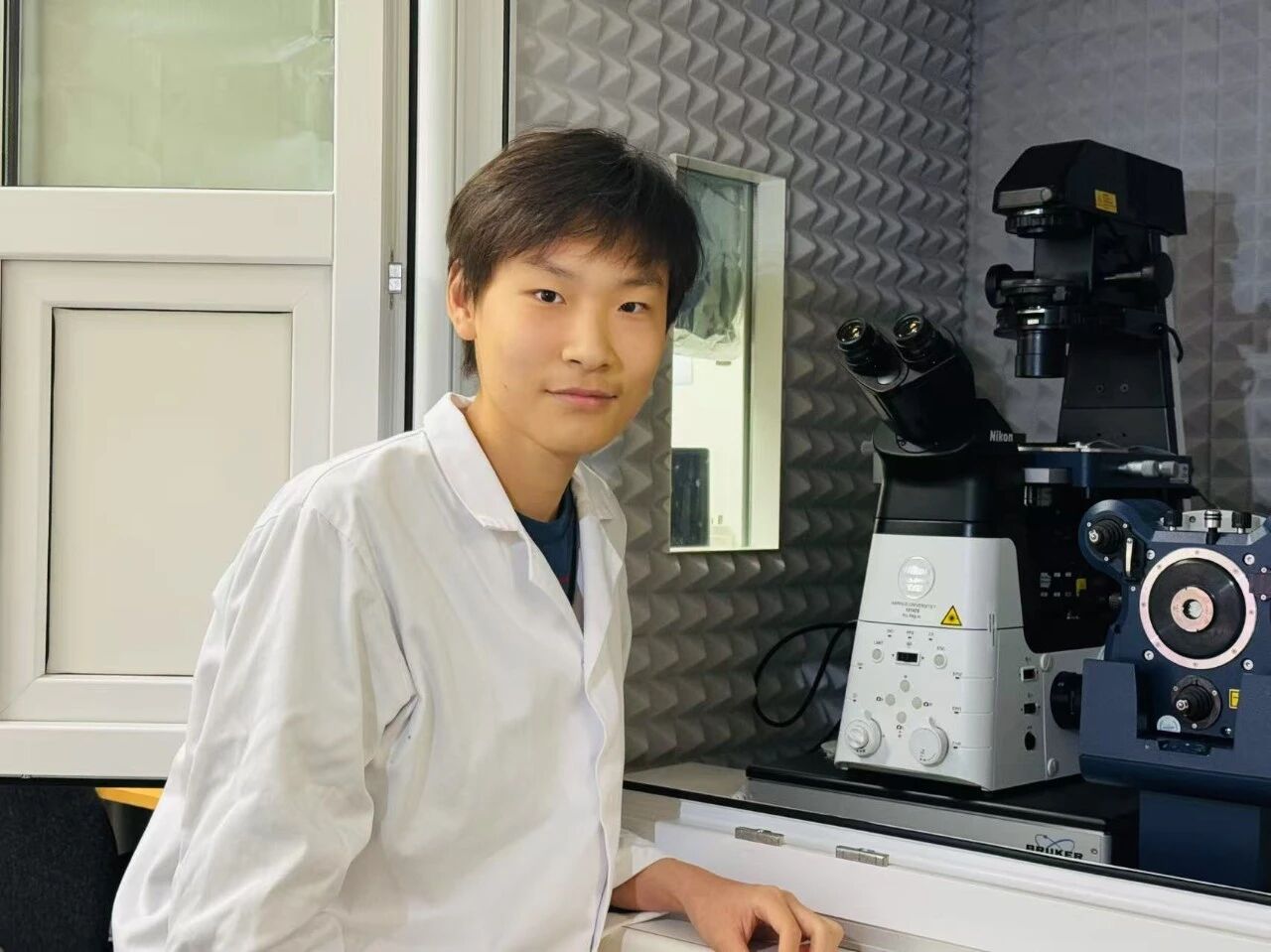
PART 7
Returning to the International Stage: Comprehensive Enhancement of Research Capabilities
In 2025, I participated again in an IEEE international conference, bringing new research insights. This attendance was different from previous outcome reports; it felt more like a growth opportunity for learning and exchange. Through prior research, I had initially accumulated experience in academic presentation and understood more clearly that scientific research requires continuous accumulation and exploration. Looking back on my research journey with IBOWU, each project helped broaden my horizons and enhance my abilities, laying the foundation for my future research path. I look forward to exchanging ideas with more scholars at the international conference, gaining guidance, and further maturing my scientific thinking.
Looking back on this six-year research journey, I deeply feel the power of gradual, step-by-step progress. From a middle school student full of curiosity about research but unsure where to start, to someone capable of independently designing and conducting research projects today – every day and night spent striving in the lab, every instance of perseverance in the face of difficulty, has helped me become a better version of myself. On the quality research platform provided by IBOWU, I completed the entire growth process from research initiation to independent investigation. I not only learned how to rigorously design and complete experiments but, more importantly, found my passion and confidence in scientific research. This experience has laid a solid research foundation for me and prepared me to eagerly welcome future challenges and opportunities on my academic path.
— This article is based on an interview with JSR long-term program student L.
About IBOWU · JSR
JSR™ is China's first junior science academy initiated by non-governmental forces. Launched by IBOWU, a well-known platform in China for providing scientific research and academic projects for youth, JSR aims to offer high-quality scientific practice platforms for Chinese teenagers.
IBOWU has received investment from BGI Group and TAL Education Industry Fund. Leveraging strong scientific and capital backing, JSR has gathered dozens of multi-disciplinary frontline scientists from around the globe and established joint laboratory resources spanning numerous universities and research institutions in countries including China, the USA, Denmark, Norway, Singapore, and Australia. JSR is committed to providing students with high-end STEM advanced academic projects and elite training plans, striving to cultivate the scientific spirit among Chinese youth and contribute to the reserve of scientific and technological talent for China and the world.


